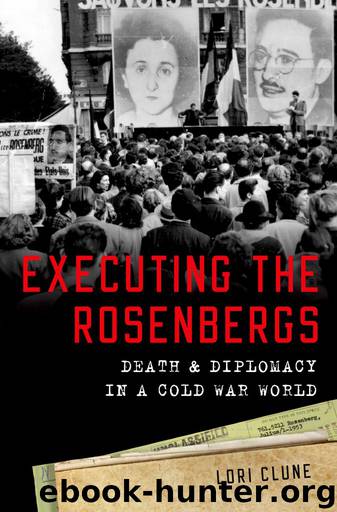Executing the Rosenbergs: Death and Diplomacy in a Cold War World by Lori Clune

Author:Lori Clune [Clune, Lori]
Language: eng
Format: epub
Publisher: Oxford University Press
Published: 2016-04-08T00:00:00+00:00
Conclusion
No one emerges from the Rosenberg story unscathed. Administration officials, prosecutors, and defendants all made decisions that undermined their own interests, and there is a plague on all their houses. This case remains emblematic of the tragic consequences that result when actions are driven by paranoia and fear.
Both Truman and Eisenhower governed within the pressure cooker that was the early Cold War. Convinced that the very future of the United States and quite possibly the world was at risk, they made national security their number one priority. Both presidents strove to avoid showing any sign of weakness, to trigger any perception of being weak on Communism. Nuclear bombs were a constant reminder that a global apocalypse was a horrifyingly real threat. Truman and Eisenhower directed their administrations to be strong and take the danger seriously, for they knew millions could die.
When the Soviet Union tested its first atomic bomb, the FBI strove to uncover espionage and punish those responsible. Pressure increased when officials—incorrectly—blamed Communist aggression in Korea on an emboldened, nuclear-armed Soviet Union.1 Already under fire from the Republicans for his supposed softness on Communism, Truman decided he could not be gentle with the only spies they were able to indict. This included pressuring Julius with his wife’s arrest and threatening to execute them both. In imposing the death penalty the administration hoped that the couple would talk, future spies would be deterred, and the world would be impressed with America’s tough stand against Communism.
Eisenhower inherited the Rosenberg case. As a former military man, he understood chain of command and was not eager to use the executive branch to interfere with decisions of the judiciary. He would allow the executions to proceed. He also saw the case as an opportunity to send a signal that spies would not be tolerated.2 He held firm, adhering to a conviction that clemency for the Rosenbergs would show weakness and threaten national security.3 Emotional appeals concerning the Rosenberg sons did not move him; Eisenhower believed that if Julius and particularly Ethel had been good parents, they never would have put their children at risk in the first place.
When the Rosenbergs’ appeals dragged on and the Korean War bogged down, many Americans clamored for a definitive victory. In Korea they had to settle for limited containment after a long and costly conflict, but as a journalist observed in 1953, Americans could score a win on the espionage front. “The U.S. could not stop the Russians from getting the bomb, sooner or later; but the Rosenbergs could be executed,” he explained. “We cannot or could not end the war in Korea; but we can execute the Rosenbergs.”4 The majority of Americans embraced a cathartic electrocution to show strength, calm nuclear anxiety, and ease the pain of an inconclusive, confusing, and deadly military action thousands of miles away.
Eisenhower believed his refusal to pardon the Rosenbergs strengthened his appearance in the aftermath of his approval of an unsatisfying truce in Korea.5 The president tolerated no sign of weakness, no letting down of the nation’s collective guard in the early months of his administration.
Download
This site does not store any files on its server. We only index and link to content provided by other sites. Please contact the content providers to delete copyright contents if any and email us, we'll remove relevant links or contents immediately.
| Arms Control | Diplomacy |
| Security | Trades & Tariffs |
| Treaties | African |
| Asian | Australian & Oceanian |
| Canadian | Caribbean & Latin American |
| European | Middle Eastern |
| Russian & Former Soviet Union |
The Secret History by Donna Tartt(19088)
The Social Justice Warrior Handbook by Lisa De Pasquale(12190)
Thirteen Reasons Why by Jay Asher(8909)
This Is How You Lose Her by Junot Diaz(6886)
Weapons of Math Destruction by Cathy O'Neil(6279)
Zero to One by Peter Thiel(5801)
Beartown by Fredrik Backman(5754)
The Myth of the Strong Leader by Archie Brown(5507)
The Fire Next Time by James Baldwin(5444)
How Democracies Die by Steven Levitsky & Daniel Ziblatt(5218)
Promise Me, Dad by Joe Biden(5153)
Stone's Rules by Roger Stone(5087)
A Higher Loyalty: Truth, Lies, and Leadership by James Comey(4963)
100 Deadly Skills by Clint Emerson(4925)
Rise and Kill First by Ronen Bergman(4788)
Secrecy World by Jake Bernstein(4753)
The David Icke Guide to the Global Conspiracy (and how to end it) by David Icke(4718)
The Farm by Tom Rob Smith(4509)
The Doomsday Machine by Daniel Ellsberg(4490)
